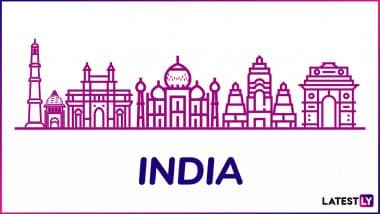Chandigarh, Aug 18 (PTI) Reiterating his state's stand to build the SYL canal at the earliest, Haryana Chief Minister Manohar Lal Khattar on Tuesday told Punjab that its construction and availability of water are two different issues and must not be confused.
In a meeting on Sutlej-Yamuna Link canal, convened on the directions of the Supreme Court, which asked the Centre on July 28 to mediate between the two states on the decades-old issue, both Haryana and Punjab stuck to their stands.
At the meeting, Khattar strongly advocated for the honouring of the apex court verdict to complete the SYL canal's construction.
He also emphasized upon the immediate need for building the channel with adequate capacity to help Haryana draw its legitimate share of water, a state government release said here on Tuesday evening.
Also Read | Rajasthan: Man Killed After Fire Breaks Out at Firecracker Godown in Jaipur.
On Punjab Chief Minister Amarinder Singh's claim that availability of water has gone down, Khattar said the construction of SYL and availability of water are two different issues and completely unconnected and should not be confused.
“Allocation of water between states shall have to be pro rata, depending on the current availability of water as provided in the 1981 agreement,” he said.
In a video conference with Khattar and Union Jal Shakti Minister Gajendra Singh Shekhawat, the Punjab chief minister had argued that the SYL canal issue was an emotive one and could disturb the national security and his state will “burn” if asked to share water.
“We maintained our stand that the SYL should be constructed. The Supreme Court too has said that,” Khattar had told reporters after the meeting.
Meanwhile, according to the Haryana government statement, Khattar also argued during the meeting that there is clear evidence that surplus, unchanneled waters of Ravi, Sutlej and Beas have been flowing to Pakistan for the last 10 years, resulting in a colossal waste of national resource.
“In fact, the Central Water Commission (CWC) had quantified this flow from Ravi river at 0.58 MAF, advocating the construction of a second Ravi-Beas link at Dharamkot. Water also flows to Pakistan downstream of Ferozepur especially during the monsoon," he said.
He argued that such surplus water can be harnessed for drinking water-starved areas of south Haryana and for groundwater recharge instead of allowing it to flow to Pakistan.
He also said main carriers of Ravi, Beas and Sutlej waters in Haryana at present are Bhakra Main Line (BML) and Narwana Branch, which are more than 50 years old and "run 24x7, 365 days a year" and have considerably deteriorated and need maintenance.
He warned that the failure to maintain the BML and Narwana Branch would lead to a major humanitarian disaster in case of any major breach in any of these canals as they carry water for drinking purposes also apart from irrigation.
“So, an alternate carrier is the need of the hour. SYL canal can serve all these purposes apart from carrying a legitimate share of Haryana water and indent-free surplus water, which otherwise is flowing to Pakistan,” argued Khattar.
He said while Haryana is open for dialogue and discussion on the subject but with a clear stipulation that construction of SYL must be completed as per the Supreme Court decree at the earliest.
“Not doing so is a gross injustice to the people of water-deprived areas of Haryana, struggling to receive its fair share of water despite a clear and unambiguous judgement of the Supreme Court in its favour,” he said.
Shekhawat, as per the statement, also stated in no uncertain terms that infrastructure and carrier capacity in the shape of SYL canal has to be created to harness Haryana's allocated share of water as per its current availability and also to harness the part of water flowing to Pakistan.
Responding to the Punjab chief minister's demand for Yamuna waters, Shekhawat said that Punjab had raised this issue earlier also before the Supreme Court and it had been discussed and deliberated at length before delivery of the judgement on SYL by the apex court.
“Moreover, this issue is not relevant now, as agreement on sharing of Yamuna waters has already been finalised in the 1994 agreement among Haryana, Himachal, Uttar Pradesh, Rajasthan and Delhi,” Shekhawat said.
(This is an unedited and auto-generated story from Syndicated News feed, LatestLY Staff may not have modified or edited the content body)













 Quickly
Quickly
















